Arise My Love (1940)
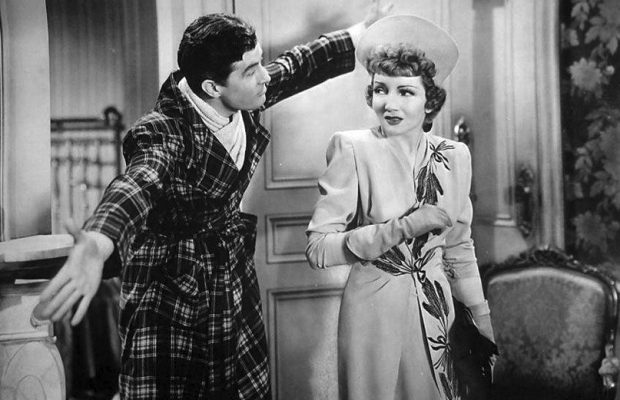
Toronto Film Society presented Arise My Love (1940) on Sunday, April 10, 1988 in a double bill with The General Died at Dawn as part of the Season 40 Sunday Afternoon Film Buffs Series “A”, Programme 12.
Production Company: Paramount. Producer: Arthur Hornblow, Jr. Director: Mitchell Leisen. Screenwriter: Charles Brackett, Billy Wilder, based on a stsory by Blenjamin Glazer, John S. Toldy. Photographer: Charles Lang. Music: Victor Young. Art Directors: Hans Dreier, Robert Usher. Editor: Doane Harrison.
Cast: Claudette Colbert (Augusta Nash), Ray Milland (Tom Martin), George Zucco (Prison Governor), Walter Abel (Phillips), Frank Puglia (Father Jacinto), Dennis O’Keefe (Shep), Dick Purcell (Pink), Cliff Nazarro (Botzelberg), Esther Dale (Susie), Lionel Pape (Lord Kettlebrook), Robert O. Davies (Prussian Officer), Michael March (Botzelberg Assistant), Jesus Topete (Guard), Nester Paiva (Uniformed Clerk), Fred Malatesta (Mechanic).
Released in October 1940 Arise My Love initially caused concern to its makers, Leisen and Hornblow, because of the film’s involvement in a European war with which America was not yet involved. “Leisen told the press that he was holding off shooting the film until the last day, and the conclusion would be dictated by the newspaper headlines that morning” (Hollywood Director, David Chierchetti, p. 147). Enjoying an immediate box office success, Arise My Love says little about the war but much about “the two charming components of frivolity, Colbert and Milland” (New York Times, 1940).
Typically of Leisen, the film opens on a low key motif–white lettering on a dark background; an uninspiring marching tune; a Spanish cell where Milland awaits the firing squad. Escorted to the Warden’s office by the prison guards, Milland is confronted with the vivacious embraces of Colbert after a frantic search for her long lost husband (Colbert and Milland are total strangers to one another). The film at once shifts from a grim war story to absurd high comedy when Colbert kidnaps Milland from his death cell. Escaping to Paris in a stolen plane, the “newlyweds” are instant front-page headlines–a feat which enables Colbert to opt out of a dull fashion reporting assignment and Milland’s amorous advances to be reassigned to Berlin.
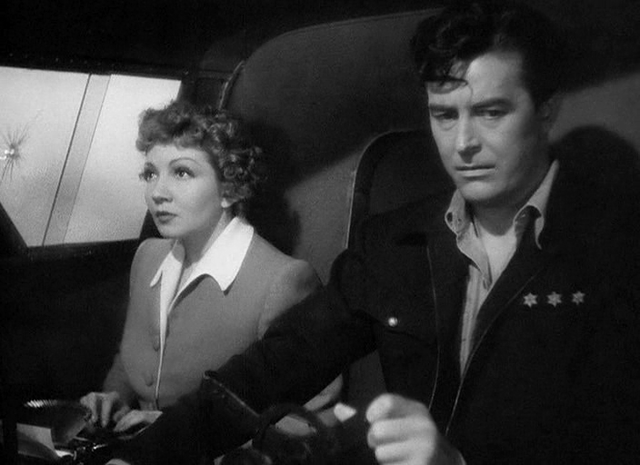
En route to Berlin, Colbert is sidetracked from her mission by the wily charms of Milland who has followed her on the train, the reunited lovers spending an idyllic few days in a village inn near the German border, remaining blithely unaware of the German invasion. The funny repartee sustained throughout the first half hour of the film fades out and the combined alents of Leisen and Brackett produce a scene memorable for its lyrical images and a poetic sense of the historical past. Colbert asks Milland what he sees out of the train window to which he replies, “Stately trees practising their curtsies in the breeze because they think Louis XIV is still king”. The realities of modern European politics soon force the couple’s hurried escape back to America aboard the Athenia when the liner is torpedoes and Colbert and Milland are washed ashore. Colbert and Milland, now embroiled in the war situation, vow to put aside personal feelings and devote themselves to the war effort.
Special effects and authentic set designs, as Leisen diarizes, were of particular importance to Leisen’s realization of this film: “When the Athenia is torpedoed…the set was absolutely solid on the floor of the soundstage…We set off a gross of falshbulbs for the explosion. Then I…cut in two pure white frames in the height of the burst so the screen was absolutely white. The water was all from firehoses. We just opened them up and hit the side of the boat. We had to train the actors to fall around like they’d been hit. One thing I noticed, much to my disappointment, was that the deck chairs didn’t move. They should have slid forward.” (Mitchell Leisen, Hollywood Director, p. 152). The scene of the bar at Maxim’s was an exact duplicate of the real Maxim’s. Even the headwaiter was a close to the real Charles as we could get because Charles was quite famous. (Hollywood Director, p. 150).
As second choice male lead to Joel McCrea, Ray Milland in his first feature film, recalls previewing the rough cut of Arise My Love while on location with Leisen for I Wanted Wings: “It was after midnight, but I called up my wife long distance and said, “Mal, honey, when this picture comes out I’m finished. Sell every thing we’ve got and we’ll try to start a new life somewhere else’. Then it came out and was an enormous hit which really boosted my career”. (Hollywood Director, p. 154.)
Notes by Donna Hall

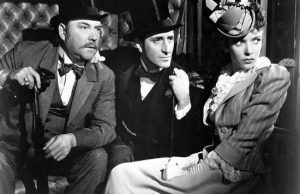
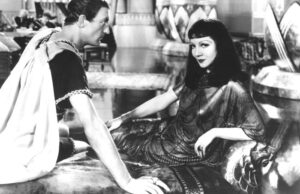
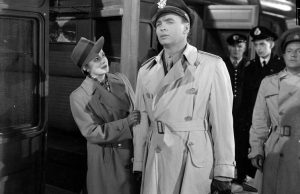






Leave a Reply